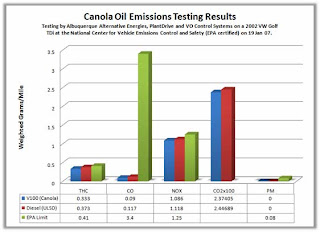Greasecar compared emissions from diesel, SVO, homemade biodiesel and professional biodiese, burned in a 1981 VW Vanogon. Although nitrogen oxide (NOx) emissions remained stable the use of SVO reduced carbon monoxide (CO) and particulate matter (PM). Similar tests by the National VegOil Board examined the difference between ultra low sulfur diesel (ULSD) and SVO as burned by a 2002 VW Golf, and documented reductions in total hydrocarbons (THC), carbon dioxide (CO2), CO, and NOx, leading them to assert that "vegetable oil represents one of the best "green" fuels available at this time".

So now the next time I'm driving through the city and there's an Air Quality Alert being broadcast from all the electronic highway signs, cautioning the elderly and children to remain indoors, I'll know that I've made an effort to reduce the negative impact my transportation has on the quality of air we all breathe.
No comments:
Post a Comment